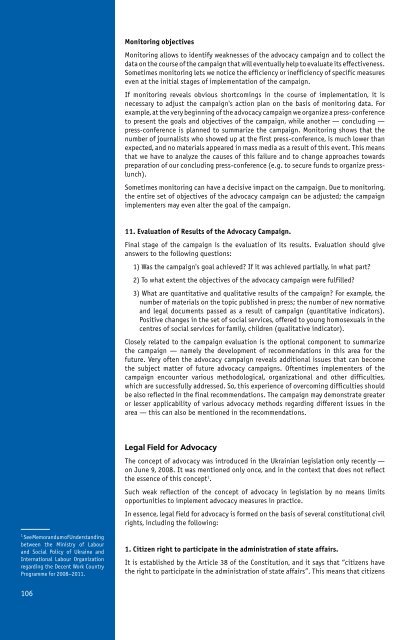Social Work with People Practicing Same-Sex ... - ILGA Europe
Social Work with People Practicing Same-Sex ... - ILGA Europe
Social Work with People Practicing Same-Sex ... - ILGA Europe
Create successful ePaper yourself
Turn your PDF publications into a flip-book with our unique Google optimized e-Paper software.
1 See Memorandum of Understanding<br />
between the Ministry of Labour<br />
and <strong>Social</strong> Policy of Ukraine and<br />
International Labour Organization<br />
regarding the Decent <strong>Work</strong> Country<br />
Programme for 2008–2011.<br />
106<br />
Monitoring objectives<br />
Monitoring allows to identify weaknesses of the advocacy campaign and to collect the<br />
data on the course of the campaign that will eventually help to evaluate its effectiveness.<br />
Sometimes monitoring lets we notice the efficiency or inefficiency of specific measures<br />
even at the initial stages of implementation of the campaign.<br />
If monitoring reveals obvious shortcomings in the course of implementation, it is<br />
necessary to adjust the campaign's action plan on the basis of monitoring data. For<br />
example, at the very beginning of the advocacy campaign we organize a press-conference<br />
to present the goals and objectives of the campaign, while another — concluding —<br />
press-conference is planned to summarize the campaign. Monitoring shows that the<br />
number of journalists who showed up at the first press-conference, is much lower than<br />
expected, and no materials appeared in mass media as a result of this event. This means<br />
that we have to analyze the causes of this failure and to change approaches towards<br />
preparation of our concluding press-conference (e.g. to secure funds to organize presslunch).<br />
Sometimes monitoring can have a decisive impact on the campaign. Due to monitoring,<br />
the entire set of objectives of the advocacy campaign can be adjusted; the campaign<br />
implementers may even alter the goal of the campaign.<br />
11. Evaluation of Results of the Advocacy Campaign.<br />
Final stage of the campaign is the evaluation of its results. Evaluation should give<br />
answers to the following questions:<br />
1) Was the campaign's goal achieved? If it was achieved partially, in what part?<br />
2) To what extent the objectives of the advocacy campaign were fulfilled?<br />
3) What are quantitative and qualitative results of the campaign? For example, the<br />
number of materials on the topic published in press; the number of new normative<br />
and legal documents passed as a result of campaign (quantitative indicators).<br />
Positive changes in the set of social services, offered to young homosexuals in the<br />
centres of social services for family, children (qualitative indicator).<br />
Closely related to the campaign evaluation is the optional component to summarize<br />
the campaign — namely the development of recommendations in this area for the<br />
future. Very often the advocacy campaign reveals additional issues that can become<br />
the subject matter of future advocacy campaigns. Oftentimes implementers of the<br />
campaign encounter various methodological, organizational and other difficulties,<br />
which are successfully addressed. So, this experience of overcoming difficulties should<br />
be also reflected in the final recommendations. The campaign may demonstrate greater<br />
or lesser applicability of various advocacy methods regarding different issues in the<br />
area — this can also be mentioned in the recommendations.<br />
Legal Field for Advocacy<br />
The concept of advocacy was introduced in the Ukrainian legislation only recently —<br />
on June 9, 2008. It was mentioned only once, and in the context that does not reflect<br />
the essence of this concept 1 .<br />
Such weak reflection of the concept of advocacy in legislation by no means limits<br />
opportunities to implement advocacy measures in practice.<br />
In essence, legal field for advocacy is formed on the basis of several constitutional civil<br />
rights, including the following:<br />
1. Citizen right to participate in the administration of state affairs.<br />
It is established by the Article 38 of the Constitution, and it says that “citizens have<br />
the right to participate in the administration of state affairs”. This means that citizens


